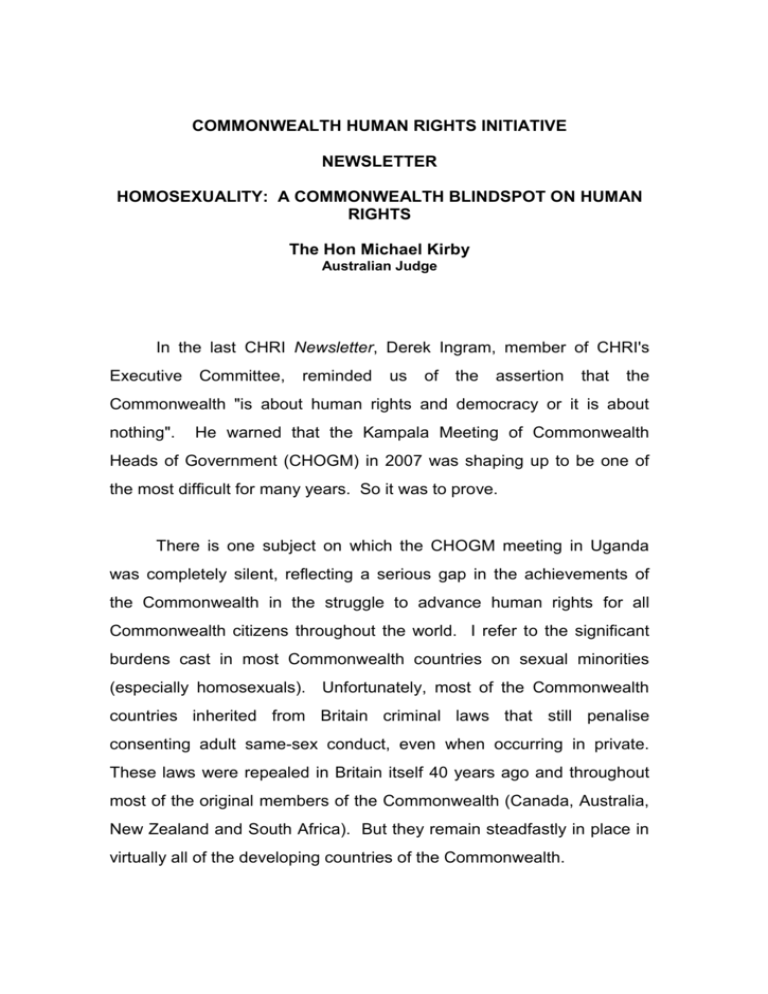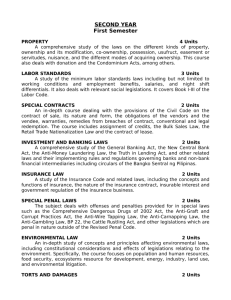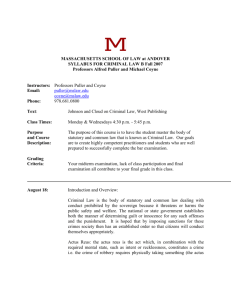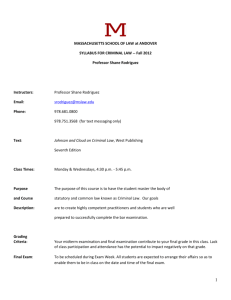
COMMONWEALTH HUMAN RIGHTS INITIATIVE
NEWSLETTER
HOMOSEXUALITY: A COMMONWEALTH BLINDSPOT ON HUMAN
RIGHTS
The Hon Michael Kirby
Australian Judge
In the last CHRI Newsletter, Derek Ingram, member of CHRI's
Executive
Committee,
reminded
us
of
the
assertion
that
the
Commonwealth "is about human rights and democracy or it is about
nothing".
He warned that the Kampala Meeting of Commonwealth
Heads of Government (CHOGM) in 2007 was shaping up to be one of
the most difficult for many years. So it was to prove.
There is one subject on which the CHOGM meeting in Uganda
was completely silent, reflecting a serious gap in the achievements of
the Commonwealth in the struggle to advance human rights for all
Commonwealth citizens throughout the world. I refer to the significant
burdens cast in most Commonwealth countries on sexual minorities
(especially homosexuals). Unfortunately, most of the Commonwealth
countries inherited from Britain criminal laws that still penalise
consenting adult same-sex conduct, even when occurring in private.
These laws were repealed in Britain itself 40 years ago and throughout
most of the original members of the Commonwealth (Canada, Australia,
New Zealand and South Africa). But they remain steadfastly in place in
virtually all of the developing countries of the Commonwealth.
2.
Recent press reports (including from Uganda) disclose strong, and
apparently officially backed, attitudes of homophobia and discrimination
that diminish respect for the human rights of this minority. Not only do
these attitudes make it more difficult for the promotion of safer sex
messages that are essential for prevention of the further spread of
HIV/AIDS. More fundamentally, these diminutions of the human dignity
for an attribute of nature that is as indelible as race and skin colour,
appear as a serious gap in the Commonwealth's agenda to uphold
human rights of all its peoples.
A recent review of the criminal laws in Commonwealth countries
discloses that, in most of them, the Penal Code continues to include
offences targeting specifically homosexual men.
Since the research
throughout the twentieth century on the origins and prevalence of
variations in sexual orientation and following the reforms of the criminal
law in the countries that first made such laws, there is no excuse for the
continued resistance to reform existing in most nations of the
Commonwealth. Indeed, it is time, and beyond time, for the repeal of
those laws both for human rights reasons and so as to improve the
chances of getting the messages out to affected populations in countries
which are already seriously affected by the spread of HIV/AIDS.
If the list of countries where the old criminal offences are still
maintained is placed alongside the list of countries where HIV
prevalence is highest, there is a remarkable coincidence in the nations
3.
concerned. Sadly, on this issue, the outgoing Secretary-General of the
Commonwealth, Don McKinnon, who was otherwise plain-speaking on
infractions of human rights, maintained a puzzling silence. The likely
attitude
of
the
incoming
Commonwealth
Secretary-General,
Mr
Kamalesh Sharma (India), is unknown. However, attempts to secure the
repeal of the applicable provision of the Indian Penal Code, s 377 has so
far failed for lack of parliamentary leadership. This is so despite a strong
open letter published in the media of India, signed by leading figures of
Indian public life, including the Nobel Laureate Amatya Sen and the
former Attorney-General, Soli Sorabjee.
The list of shame of the surviving criminal provisions targeting
homosexual Commonwealth citizens should have the early attention of
Mr Sharma as he takes up his duties as Secretary-General. Above his
desk he should have inscribed in gold, the motto: "The Commonwealth
is about human rights and democracy or it is about nothing". This is the
list:
Bangladesh
Barbados
Belize
Botswana
Brunei
Cook Islands
[Fiji
Gambia
Ghana
Grenada
Guyana
India
Jamaica
Penal Code 1860, s 377
Sexual Offences Act 1992, ss 9, 12.
Criminal Code (Revised 2003), s 53
Penal Code ss 164, 165, 167
Penal Code 1951, s 377
Crimes Act 1969, ss 154, 155
Penal Code 1985, ss 175, 176, 177 (declared
unconstitutional 2005)]
Criminal Code 1965, art 144
Criminal Code 1960 (Rev 1997) art 105
Criminal Code, art 431
Criminal Law (Offences) Act ss 352, 353, 354
Indian Penal Code 1860, s 377
Offences Against the Person Act, arts 76, 77, 79
4.
Kenya
Kiribati
Lesotho
Malawi
Malaysia
Maldives
Mauritius
Mozambique
Namibia
Nauru
Penal Code Cap 63, ss 162, 163, 165
Penal Code Cap 67 Revised 1977 ss 153, 154, 155
Sodomy is reportedly a criminal offence
Penal Code Cap 7:01, ss 153, 156
Penal Code (Act No 574 consol 1998) 377A, 377B
Penal Code of 1960, ss 377C, 377D
Criminal Code s 250
Penal Code of September 16, 1886, arts 70, 71
Sodomy offence reported.
Criminal Code of Qld (since repealed in Queensland)
applied to Nauru, s 208
Criminal Code Act (Ch 77, Laws 1990), ss 214, 215,
Nigeria
217
Also laws of States of Nigeria
Pakistan
Penal Code 1860, s 377
Papua & New
Criminal Code 1974, ss 210, 212, 336
Guinea
Saint Kitts and
Offences Against the Person Act, ss 56, 57
Nevis
Saint Lucia
Criminal Code ss 132, 133
St Vincent and
Criminal Code 1990, ss 146, 148
The Grenadines
Sierra Leone
Offences Against the Person Act 1861, ss 61, 62
Singapore
Penal Code (Cap 22 Revised 1998) ss 377, 377A
Solomon Islands
Penal Code (Cap 26) ss 160, 161, 162
Sri Lanka
Penal Code of 1883 (No 2 Cap 19), art 365
Swaziland
Sodomy offence reported
Tanzania
Penal Code of 1945 (amended 1998), arts 154, 155
Tonga
Carnal Offences [Cap 18] ss 136, 137, 139, 140
Trinidad & Tobago Sexual Offences Act (Cap 106) ss 140, 141, 143
Western Samoa
Crimes Ordinance 1961, ss 58D, 58E, 58G
Zambia
The Penal Code Act (1995 ed rev'd) ss 155, 156, 158
[Zimbabwe
Criminal Law (Codification and Reform) Act [Chapter
9:23] Act 23/2004), s 73]
A recent attempt to reform the provisions of the Singapore Penal
Code failed despite earlier eloquent words of support for reform by the
former Singapore Prime Minister, Mr Lee Kwan Yew. In the Singapore
Parliament the reform proposal was based on a compelling report of the
Singapore Law Society.
However, it was opposed on the basis of
supposed "conservative" values and by MPs speaking from a particular
5.
religious viewpoint.
The imposition of criminal penalties, stigma and
discrimination in the name of religion is a major challenge for the
Commonwealth as it faces the decades ahead.
In such a vast community of races, creeds and other diversities,
there needs to be a space for all citizens to live their lives in freedom
and without fear or oppression. The message of the Commonwealth
Human Rights Initiative to the new Secretary-General should be one of
encouragement
to
advance
the
human
rights
agenda
of
the
Commonwealth. This should include the all too long neglected concern
of the human rights of sexual minorities - the human rights blindspot of
the Commonwealth of Nations.
The way ahead is for the new Secretary-General to form an
Advisory Panel of experienced Commonwealth citizens to consult with
countries of the Commonwealth and to explore ways in which law reform
might best be achieved.
The Commonwealth has been very strong in
building defences against racial discrimination. Increasingly in recent
years it has done fine work in combating gender discrimination, poverty
and HIV. A new initiative on discrimination on the grounds of sexuality is
now needed.
This is a real test for the universality of the
Commonwealth's respect for human rights.
COMMONWEALTH HUMAN RIGHTS INITIATIVE
NEWSLETTER
HOMOSEXUALITY: A COMMONWEALTH BLINDSPOT ON HUMAN
RIGHTS
The Hon Michael Kirby
Australian Judge









